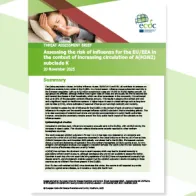ECDC recommends vaccinating without delay due to early flu circulation
‘We are seeing influenza detections increasing much earlier than usual this year, and that means time is critical,’ says Edoardo Colzani, Head of Section Respiratory Viruses at ECDC. ‘If you are eligible for vaccination, please don’t wait. Getting vaccinated now is one of the most effective ways to protect yourself and those around you from serious illness this winter.’
While uncertainty remains regarding the public health impact of the upcoming influenza season, ECDC is preparing for the scenario that Europe could face a more severe influenza season than previously, especially if there is low vaccine uptake. A higher than usual number of infections would also add additional pressure on healthcare systems.
ECDC’s recommendations
- People at higher risk of severe disease should get vaccinated without delay. These groups include people over 65 years of age, pregnant people, people with underlying and chronic diseases or who are immunocompromised, and people living in closed settings such as long-term care facilities.
- Get vaccinated if you are a healthcare worker or work in a long-term care facility.
- Healthcare settings and long-term care facilities should strengthen their preparedness plans and infection, prevention and control measures as well as encourage staff and visitors to use face masks during periods of increased respiratory virus circulation.
- Healthcare providers should consider promptly administrating antivirals to patients at higher risk of severe disease to reduce complications.
- Healthcare providers should consider using antiviral prophylaxis during outbreaks in closed settings, e.g. long-term care facilities.
- Countries should promote clear, tailored communication on vaccination, hand hygiene and respiratory etiquette to help reduce transmission in the community.
Read the threat assessment

Circulating respiratory viruses, including influenza viruses, SARS-CoV-2 and RSV, all contribute to pressure on healthcare systems during winter in the EU/EEA.
Threat Assessment Brief - Assessing the risk of increasing circulation of A(H3N2) subclade K
English (586.88 KB - PDF)Share this page



